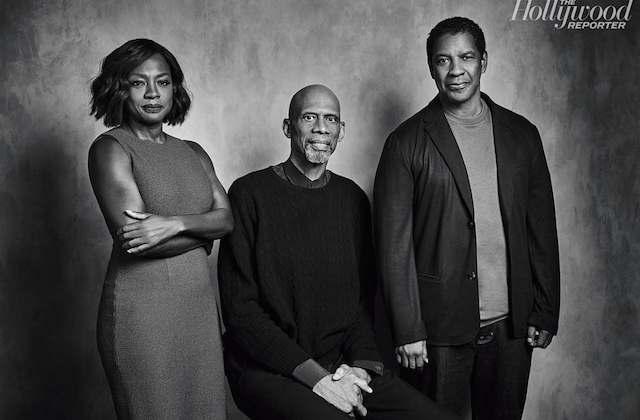NBA great Kareem Abdul-Jabbar saw tremendous contemporary urgency in Denzel Washington‘s ("Flight") upcoming film adaptation of August Wilson‘s "Fences." He said as much in the introduction for his Q&A with stars Washington (who also directed the film) and Viola Davis ("How to Get Away with Murder"). From The Hollywood Reporter‘s cover story this month:
Wilson, who died in 2005, believed that all art was political, so there’s a certain melancholy in the audience when they realize that the racial conditions and conflicts that so profoundly affect the Maxson family during the 1950s still exist today. "Fences" was first produced onstage in 1983 but is set 30 years earlier so the 1980s audience could better understand how little had changed in those three decades. Now here we are 30 years after that first production, 60 years after the play’s setting, still frustratingly aware that Black Americans are stuck on the social and political treadmill while those more privileged race past them. The recent election of Donald Trump seems like an endorsement of the racism, misogyny, homophobia and xenophobia that made the 1950s such a symbol of "Happy Days" nostalgia for Whites and of humiliating repression for Blacks and other marginalized people. One of the most powerful effects of the movie is to humanize this struggle and to inspire Americans to dismantle this tyrannical cycle.
Abdul-Jabbar took this analysis into his interview with Washington and Davis, which is available in both written and video forms. Both actors pushed back on Abdul-Jabbar’s analysis when he asked about the play and film’s present-day relevance:*
Wilson also said that all art is political. The play premiered in 1985 [sic]. Why do you think the story still is relevant after 30 years, especially after the recent presidential election that we’ve been through?
WASHINGTON: The circumstances, again, are universal. It could happen to anyone. I don’t know if it’s more political now given the election or whatever, but it’s a long way from Troy to now because now we’re post-Obama even.
DAVIS: I don’t know why I don’t see the play as political. I don’t see it as representing something any bigger than a family and a man being born into a set of circumstances and maybe not taking ownership of how he’s poisoning his family, which most of us don’t. Some of us go to our grave never taking ownership. We just cause destruction around us. [Playwright] Arthur Miller said it, and August Wilson said it: When you notice all of the sins of your father, hopefully you can approach it with forgiveness and illumination. That’s just life.
Washington also discussed Wilson, who wrote the film’s screenplay before his death, rebuking those who wanted a White director for a film the playwright felt needed a Black one:
WASHINGTON [Martin] Scorsese probably could have directed "Schindler’s List" and [Steven] Spielberg probably could have directed "Goodfellas." But it’s as much to do with the difference in culture as it is with race. We know what hair smells like when a hot comb hits it. That’s a cultural thing. We know what that smells like on Sunday mornings, usually church-related or something. In my house, it was getting ready for church and your sister was getting her hair fried. …
Smell the Bergamot?
WASHINGTON Yeah, Bergamot, exactly. Now, the average man doesn’t know what Bergamot is. What color is Bergamot? Blue, thank you. But that’s cultural, right? Bergamot. You went deep.
"Fences" premieres in theaters on December 25. Read the interview here and watch it above.
*Quotes taken from written version, which condenses and clarifies statements from the video version.
